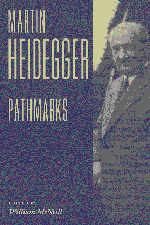Book contents
- Frontmatter
- Dedication
- Contents
- Editor's Preface
- Preface to the German Edition
- Comments on Karl Jaspers's Psychology of Worldviews (1919/21)
- Phenomenology and Theology (1927)
- From the Last Marburg Lecture Course (1928)
- What Is Metaphysics? (1929)
- On the Essence of Ground (1929)
- On the Essence of Truth (1930)
- Plato's Doctrine of Truth (1931/32, 1940)
- On the Essence and Concept of Φύσιζ in Aristotle's Physics B, I (1939)
- Postscript to “What Is Metaphysics?” (1943)
- Letter on “Humanism” (1946)
- Introduction to “What Is Metaphysics?” (1949)
- On the Question of Being (1955)
- Hegel and the Greeks (1958)
- Kant's Thesis about Being (1961)
- Notes
- References
- Editor's Postscript to the German Edition
Editor's Postscript to the German Edition
- Frontmatter
- Dedication
- Contents
- Editor's Preface
- Preface to the German Edition
- Comments on Karl Jaspers's Psychology of Worldviews (1919/21)
- Phenomenology and Theology (1927)
- From the Last Marburg Lecture Course (1928)
- What Is Metaphysics? (1929)
- On the Essence of Ground (1929)
- On the Essence of Truth (1930)
- Plato's Doctrine of Truth (1931/32, 1940)
- On the Essence and Concept of Φύσιζ in Aristotle's Physics B, I (1939)
- Postscript to “What Is Metaphysics?” (1943)
- Letter on “Humanism” (1946)
- Introduction to “What Is Metaphysics?” (1949)
- On the Question of Being (1955)
- Hegel and the Greeks (1958)
- Kant's Thesis about Being (1961)
- Notes
- References
- Editor's Postscript to the German Edition
Summary
The collection Wegmarken, in its present form as volume 9 of the Gesamtausgabe, has been extended by the inclusion of two separate essays and provided with marginal notes from the various personal copies belonging to the author.
Newly included are the “Comments on Karl Jaspers's Psychology of World-views” from 1919/21, and the essay “Phenomenology and Theology” (1927). The encounter with Jaspers, which understands itself as a “positive and illuminating critical review of this work published by Jaspers,” is guided by the beginning of the question of being that finds explicit formulation in Heidegger. Here it takes the early form of the question concerning the meaning of the being of the “I am” (existence, Dasein) as distinct from the meaning of being found in the “something is something” that belongs to objectifying thinking.
The essays have been newly ordered in accordance with the chronological principle of when they were written. The volume now contains path-marks belonging to the period from 1919 to 1961. The correspondence of pagination with that of the first edition (1967) is given in the margins.
Various minor textual corrections that serve only to clarify were incorporated from Heidegger's own editions. According to the author, these corrections were not to be explicitly noted. In addition, all texts were examined for previous printing errors.
Information
- Type
- Chapter
- Information
- Pathmarks , pp. 383 - 385Publisher: Cambridge University PressPrint publication year: 1998
